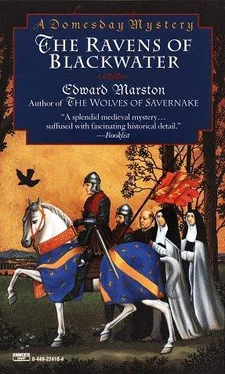Edward Marston - Ravens Of Blackwater
Здесь есть возможность читать онлайн «Edward Marston - Ravens Of Blackwater» весь текст электронной книги совершенно бесплатно (целиком полную версию без сокращений). В некоторых случаях можно слушать аудио, скачать через торрент в формате fb2 и присутствует краткое содержание. Год выпуска: 0101, Жанр: Исторический детектив, на английском языке. Описание произведения, (предисловие) а так же отзывы посетителей доступны на портале библиотеки ЛибКат.
- Название:Ravens Of Blackwater
- Автор:
- Жанр:
- Год:0101
- ISBN:нет данных
- Рейтинг книги:4 / 5. Голосов: 1
-
Избранное:Добавить в избранное
- Отзывы:
-
Ваша оценка:
- 80
- 1
- 2
- 3
- 4
- 5
Ravens Of Blackwater: краткое содержание, описание и аннотация
Предлагаем к чтению аннотацию, описание, краткое содержание или предисловие (зависит от того, что написал сам автор книги «Ravens Of Blackwater»). Если вы не нашли необходимую информацию о книге — напишите в комментариях, мы постараемся отыскать её.
Ravens Of Blackwater — читать онлайн бесплатно полную книгу (весь текст) целиком
Ниже представлен текст книги, разбитый по страницам. Система сохранения места последней прочитанной страницы, позволяет с удобством читать онлайн бесплатно книгу «Ravens Of Blackwater», без необходимости каждый раз заново искать на чём Вы остановились. Поставьте закладку, и сможете в любой момент перейти на страницу, на которой закончили чтение.
Интервал:
Закладка:
When they got within half a mile of the town, the party divided into two. The commissioners were staying at a nearby manor house. After a flurry of farewells and an expression of sincere gratitude from the prioress, Ralph Delchard went off with Canon Hubert, Brother Simon, and four of his men while Gervase Bret continued on the road to Maldon with the rest of the company. Shadows were lengthening by the time they had climbed the hill, but there was still enough light left for the visitors to take stock of the place. The returns made by the first commissioners showed that Maldon had one hundred and eighty houses, most of them belonging to the King and held directly from him by local burgesses. What Gervase had not gleaned from his documents was the fact that the vast majority of dwellings were built of timber. High Street was one long avenue of wood and thatch with only the occasional stone structure to counter the distinctive feel of an old Saxon burh.
Far below them, the Blackwater estuary was patrolled by gulls, oystercatchers, and honking geese. The thick ribbon of water twisted leisurely towards the sea and Gervase could pick out a couple of small boats navigating their way past Osea Island against the tidal flow. The priory stood on a patch of land near the lower end of High Street and thus overlooked the Hythe, the town’s harbour, and its adjacent Church of St. Mary’s. He was fascinated to see the little convent, which seven nuns shared with Prioress Mindred. It was a single-storey building of wood, reinforced with stone and set at right angles to a tiny stone-built chapel. The houses in the town had almost no land attached to them but the priory boasted the best part of an acre, most of it given over to a walled garden. Gervase realised why the property had not been recorded by the first team of commissioners. When they visited Maldon a year or so earlier, the priory had not existed. It was one of many features of the town that the original survey had perforce omitted.
Fatigued by the journey himself, Gervase knew that the two women
must be exhausted but there was no sign of it in their gentle smiles and their upright posture. As travelling companions, they had been pleasant and uncomplaining, although he was still none the wiser about the true purpose of their visit to Barking Abbey. When they reached the gate, Gervase dismounted quickly so that he could help the prioress down from her horse. She thanked him profusely and he turned to perform the same service for Sister Tecla, holding her mount with one hand while offering her the support of the other. Although she said nothing, there was such warm gratitude in her manner that he was amply rewarded. He was no longer being blamed for his earlier overeagerness in questioning her. Sister Tecla had clearly forgiven him.
The gate of the priory opened and a stout figure of middle height
stepped out to greet the two women. Her body seemed about to burst out of her habit but her face was so completely enclosed by her wimple that only a few inches of flesh were visible around a pair of steely eyes. Prioress Mindred allowed no more than a token kiss but Sister Tecla was given a welcoming embrace. It was not extended to Gervase Bret. As the nun’s gaze fell on him, it hardened into abstract hostility.
“This is Sister Gunnhild,” introduced the prioress. “I am pleased to make your acquaintance,” he said.
Gervase inclined his head politely but he got no more than a curt nod in return. Sister Gunnhild was too old to bother with pretence and social nicety. She disliked men.
Like its eccentric owner, Champeney Hall was a weird mixture of Norman and Saxon, with a strong bias towards the former held in check by an unexpected nostalgia for the latter. To all outward appearances, the manor house was the archetypal dwelling of a thegn, a long, low building that was constructed of heavy timber and roofed with shingled wood. Internally, it bore no resemblance to the home that had served the Saxon lord who built it. In those days, the hall was divided into a series of bays, which acted as separate living quarters for the thegn, his family, his servants, his farm labourers, and even some of his livestock. Gilbert Champeney made radical alterations to that scheme of things. His home was neatly partitioned by stone walls with solid doors and he had raised the slope of the roof at the rear of the property so that it was possible to move around each chamber without banging a head against a rafter. A large, two-storey, stone-built wing had been added so that the simplicity of the Saxon hall was offset by the brooding sophistication of a Norman keep.
Gilbert himself was a generous and willing host. “My home is yours, sirs,” he said.
“We are indebted to you, my lord,” said Canon Hubert.
“Indebted,” repeated Brother Simon obsequiously.
Looking around, Ralph shrugged. “Why not burn the whole place down and build a proper Norman manor house?”
“Because this is not Normandy,” replied Gilbert with a nervous laugh. “There is no point in destruction for its own sake. Preserve what is worth preserving-that is my belief. Our king follows the same precept. The Saxons had an established legal code so he largely kept it. They had a sound currency so he retained its organisation. They had an excellent system of taxation so he extended it.” The nervous laugh was more of a snigger this time. “And it is that which has brought you all to Maldon. Taxation. Saxon common sense refined by Norman efficiency. Just like my home.”
Gilbert Champeney was a short, bustling, bald-headed man with watery blue eyes and a mobile face. Now well into his fifties, he still had the boyish enthusiasm for any project in which he was engaged and an uncomplicated ability to enjoy his life. Looking at him now, it was hard to believe that he had, like Ralph, fought with the Conqueror at Hastings. Ralph still had the unmistakable stamp of a soldier, but Gilbert seemed too soft and affable ever to have borne arms. Twenty years of living in Essex had infected him with a fondness for the nation he had helped to displace. The visitors were quick to note that his tunic had a Saxon cut to it and that he was in the process of trying to grow a beard.
“You will no doubt be hungry,” he said. “Yes!” replied Ralph.
“Famished,” said Canon Hubert.
“Then I have a treat for you. Although I have kept a Saxon reeve to run my estate and Saxon men to work it, I felt I could not survive without a Norman cook. He is at this moment roasting some steaks of beef on a spit and preparing a sauce with red wine, juice of Seville oranges, and a pinch each of ground black pepper and ginger.”
Hubert’s stomach rumbled in appreciation. “With a sprinkling of cinnamon?” he said hopefully.
“Of course.”
The canon could believe in Heaven once more.
Gilbert first called for servants to conduct the men to their respective chambers so that they could deposit all the baggage that they had brought with them. The soldiers were also shown to their quarters, much more cramped, but adequate for their purposes. Gervase Bret arrived with the other half of the armed escort in time to join his colleagues for the sumptuous meal. He warmed to their host at once. Gilbert Champeney’s hospitality had been sought because he was one of the few Norman magnates in the area who was not involved in their investigation. While others grabbed what they could and defended their illegal acquisitions with lies, forgeries, or open aggression, the
lord of this manor was content with what he possessed. He had a quality that set him apart from other Norman barons. He needed to live in harmony with the Saxon people. Gilbert wanted to be liked.
“How long will you stay in Maldon?” he said.
“For as long as your cook will favour us,” said Hubert as he stuffed boiled cabbage into his mouth. “We had not thought to find such quality in the food.”
Читать дальшеИнтервал:
Закладка:
Похожие книги на «Ravens Of Blackwater»
Представляем Вашему вниманию похожие книги на «Ravens Of Blackwater» списком для выбора. Мы отобрали схожую по названию и смыслу литературу в надежде предоставить читателям больше вариантов отыскать новые, интересные, ещё непрочитанные произведения.
Обсуждение, отзывы о книге «Ravens Of Blackwater» и просто собственные мнения читателей. Оставьте ваши комментарии, напишите, что Вы думаете о произведении, его смысле или главных героях. Укажите что конкретно понравилось, а что нет, и почему Вы так считаете.












